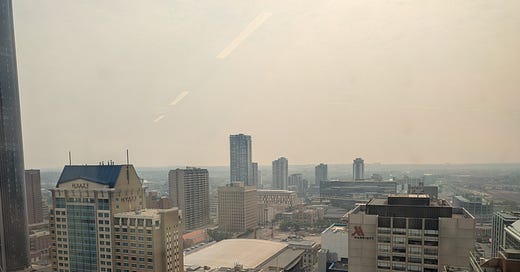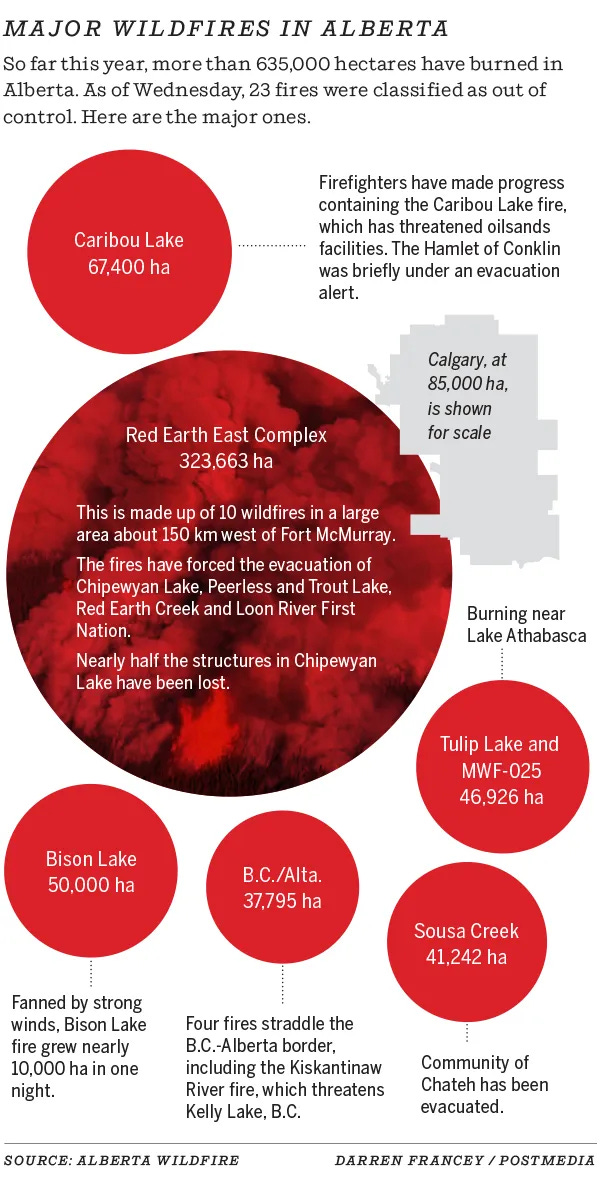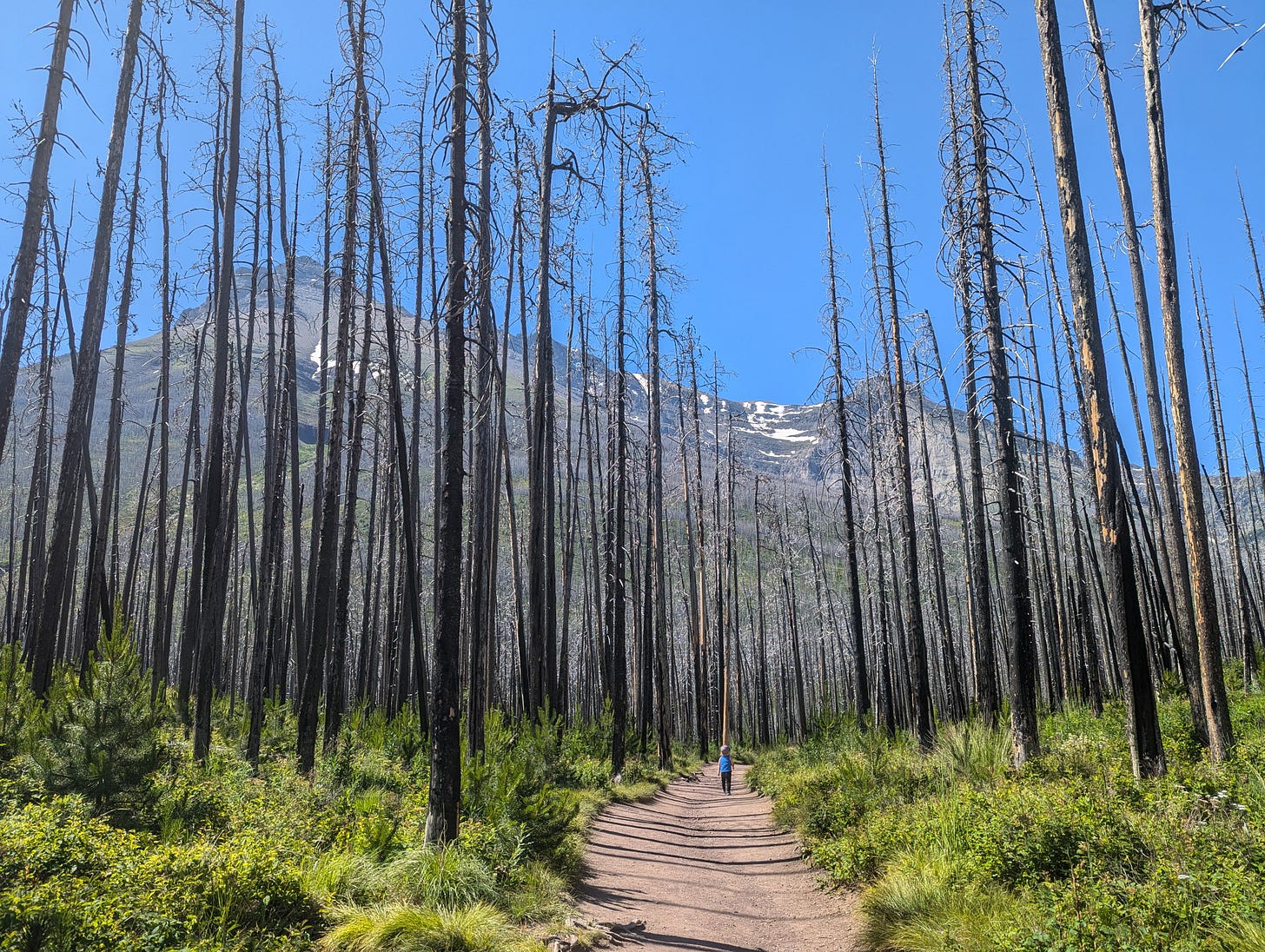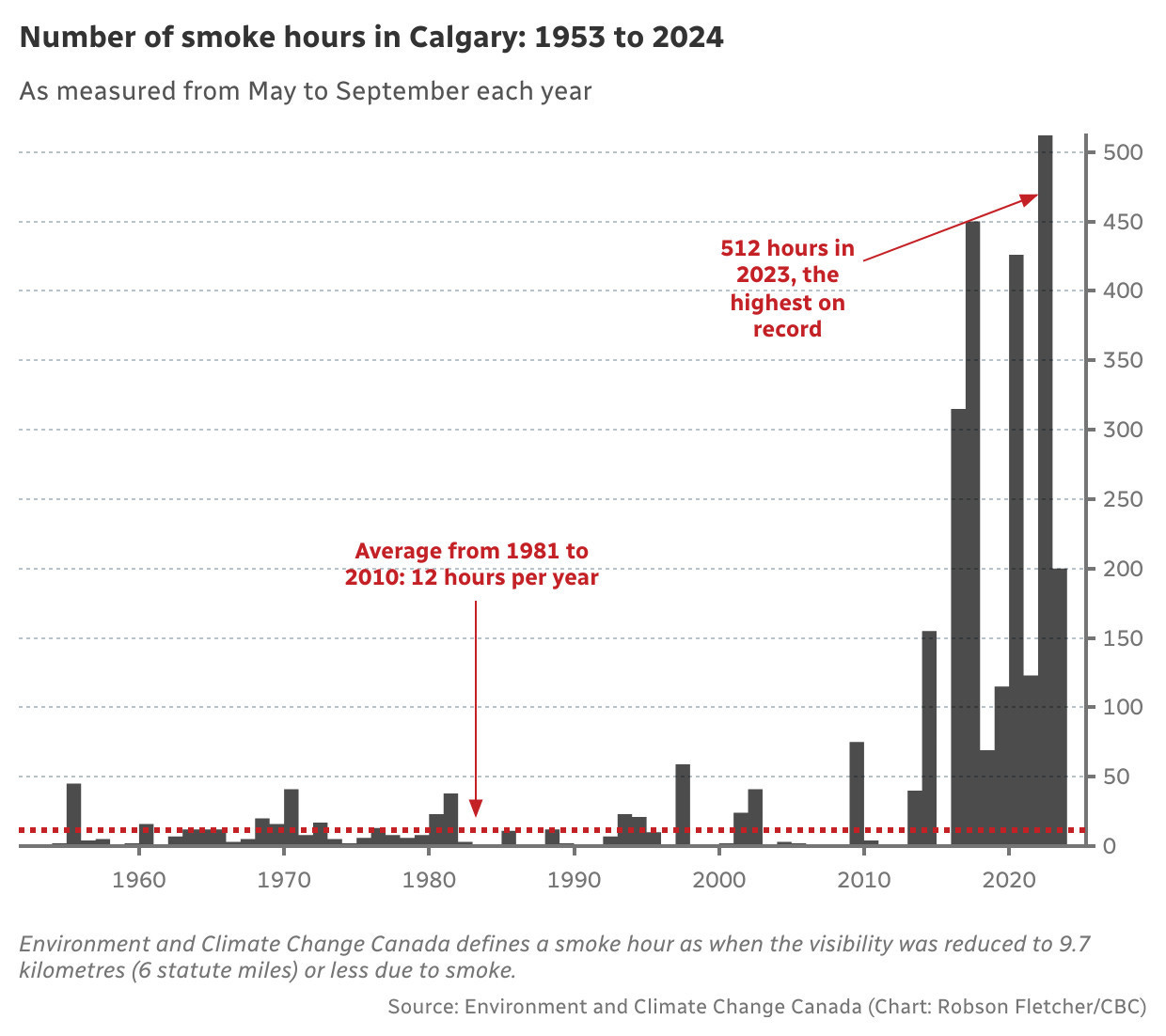Rage, Worry and Wildfire Smoke
'My three-year-old has already had more smoky days in his short life than I had throughout my entire childhood'
No filter was used on this photo, taken June 11, 2025 from the Edison building in downtown Calgary
This post is written by Annalise.
I hate talking about the weather. It’s one of my least favourite topics of conversation/small talk.
Back when I was a reporter, I would occasionally have to write about the weather, and it was a task I absolutely detested. There are so (so, so!) many more interesting things to talk about, or write about, then if it’s sunny/snowy/rainy/windy/cloudy/stormy.
With that being said, brace yourself, as this is a post about the weather. It’s a post about how insanely depressing our precious Canadian summers are becoming. It’s a post about feelings of anger and anguish and helplessness. It’s a post about big numbers and short memories and blue skies after smoky days.
When I started writing this on June 12, more than 50 wildfires burned across Alberta, leading to evacuation orders and heavy wildfire smoke blanketing a large portion of our province.
This helpful graphic from Darren Francey at the Calgary Herald explained the situation on June 11.
Environment and Climate Change Canada issued a special air quality statement for parts of the province, including Calgary, stating that the smoke was causing poor air quality and reduced visibility. Schools and daycares and after-school sports sent messages about cancelled outdoor time due to the poor air quality on June 11 & 12.
Rain late in the day on June 12 improved the situation, clearing the wildfire smoke in Calgary and aiding firefighters working across the province to contain the fires.
It’s not even July. It’s not even the middle of June. Summer has not yet officially begun and we’re already stuck inside, feeling headachy and gross and worried about longterm risks, not to mention feeling helpless as wildfires rage and people flee their homes.
“You may think air pollution is just an annoying smell of smoke – something you notice when it’s hazy outside or when your throat feels a bit scratchy – but the effects can cause significant damage to the lungs,” writes Edmonton emergency physician Dr. Shazma Mithani in a recent Globe and Mail piece that details how wildfire smoke affects our health.
As I wrote (just) 10 months ago, fleeing flames in the middle of the night shouldn’t be a normal part of childhood. Eyes stinging from smoke that forces you to spend hot summer days inside shouldn’t be a normal part of childhood. Towns burning down shouldn’t be a normal part of childhood.
And yet, here we are.
Hiking in Waterton seven years after fire tore through the area.
Slave Lake. Fort McMurray. Waterton. Lytton. Jasper. The list of places in Western Canada that have been decimated by fire in recent years grows.
“I’m 62. I always thought climate change was something facing the next generation,” Lytton mayor Jan Polderman said in 2021. “Apparently that was not a correct assumption.”
More than 90 per cent of Lytton’s structures burned down in June 2021, just a day after the village recorded Canada’s hottest-ever temperature.
The mental anguish and long-term trauma of having to race away as fire destroys your home is unthinkable. Visit Jasper, where one-third of the town’s structures burned down last summer, and chat with hotel and restaurant staff — everyone has a story that will make your heart pound and bring tears to your eyes. Like Lytton, Jasper was exceedingly hot in the days leading up to the fire. The day before the town was evacuated, the mercury reached 38 degrees Celsius.
The cost of wildfire is staggering.
Insured damages from the Jasper fire are now estimated at more than $1.2 Billion dollars.
Also staggering is the health cost from fire smoke.
A week of wildfire smoke in Ontario in June 2023 was estimated to have totaled $1.28 Billion in health impacts such as premature deaths, increased hospital visits and health emergencies, according to calculations by the Canadian Climate Institute.
“We are just starting to understand the costs of the changing climate,” the Institute’s principal economist told the Ottawa Citizen in 2023.
What we’re also, perhaps, just starting to understand, is the mental toll of smoky days.
The mental toll of having a season so many of us deeply look forward to every year completely changed for the worse. The frustration of cancelled outdoor plans while feeling guilty about being mad about a postponed backpacking trip when you know others have it so much worse, fleeing their homes. The mental tole of answering your outdoor-loving three-year-old’s questions about why he can’t go outside right now, why the smoke is making him cough and his eyes water, why the sky is yellow, why there are fires, and why, why, why.
My three-year-old has already had more smoky days in his short life in Calgary than I had throughout my entire childhood here.
Graph from a Bluesky post by Robson Fletcher
So, while I hate talking about the weather, it’s important that we do talk about the weather. It’s important we talk about climate change, we share studies and books and articles and information and we demand more from those in power.
It rained last night and I woke up to blue skies in Calgary. Memories are short. The smoke has dissipated. It’s easy to breathe a sign of relief, go outside, and completely forget the feelings of helplessness and rage.
But we shouldn’t forget. We should be angry. We should be worried. And we shouldn’t stop talking about the weather.









I'm so grateful that this piece challenges the normalization of fires. It seems like we've crossed some kind of rubicon in the news coverage. We shouldn't have to live with fires.
Great post- thanks for sharing. I think you and your readers may appreciate this article from Dr. Katharine Hayhoe - https://www.linkedin.com/pulse/we-really-doomed-katharine-hayhoe-tfouc/?trackingId=tlStSctjStutIE4NbB1DzQ%3D%3D She talks about how the overwhelming majority (80% of global citizens) want their governments to do more about climate change. However, most folks feel like they are in the minority so they stay silent on climate. We all need to be talking about this. Talking about climate = climate action.